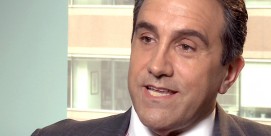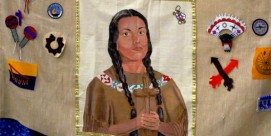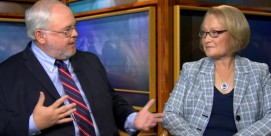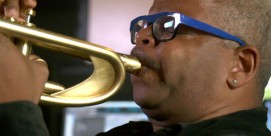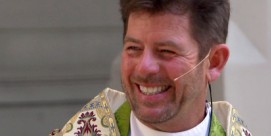In This Episode << SLIDE LEFT TO SEE ADDITIONAL SEGMENTS
Hurricane Katrina Commentary
The Rev. Fleming Rutledge is an Episcopal priest in the Diocese of New York and the author, most recently, of THE SEVEN LAST WORDS FROM THE CROSS (Eerdmans, 2004):
A splendid recent book, THE DOORS OF THE SEA: WHERE WAS GOD IN THE TSUNAMI? by David B. Hart, sharply criticizes the spectacle of people congratulating themselves for their magnanimity in the face of terrible suffering, as though human tragedy could be excused and explained as an opportunity for others to feel good about themselves. Surely Hart’s point is apposite for the present Gulf Coast catastrophe, as celebrities speak unctuously of their own generosity and news broadcasters preen themselves as they go through the rehearsed gestures and use the stock cadences that they employ for every situation, from the most trivial to the most tragic (the sole exception being Aaron Brown).
We can learn something from observing the difference between artificial sympathy and self-aggrandizing gestures, on the one hand, and genuine empathy and active help on the other. The parable of the Good Samaritan is the model. The details of the story are remarkable. The Samaritan responds to need with practical, effective, unsentimental actions attuned to the victim’s specific needs, and he makes certain that the sufferer will be cared for in the long term, guaranteeing his own return to cement the arrangement. In this parable, Christ is obliquely describing his own ministry to humanity. As the incarnate human presence of God, he is showing us the way we who live in the Spirit are empowered as his agents in the world.
As I write this on Day 5, leaders of the black community have begun mounting a powerful response to the chaotic situation in New Orleans and the media coverage of the disaster. This has been very heartening to see, because four days of television images of young black men looting and disheveled black people in dire circumstances has threatened to cause a severe dislocation in the national psyche. Whether they were conscious of it or not, viewers were absorbing the message, “This is the everlasting lot of black people, and maybe some of them have brought this on themselves by being poor, by being semi-literate, by being overweight, by having poor control over their children.” The strong offensive today by African Americans in public life will go a long way toward mitigating that perception.
There remains the very difficult matter of class. Most of the American citizens who have been reduced to living like animals in filth on the street are poor, with none of the resources that many of us take for granted. Americans like to think of themselves as a classless people, and certainly our tradition of upward mobility is rightly valued; but we should all be clear-eyed about this: our vaunted American and Christian values will be tested more strongly in this situation than they have been in a very long time. God loves the people at the New Orleans Convention Center in a special way (God really does have “a preferential option for the poor”). May he move all of us affluent Christians who are sitting at our computers in our nice clean houses to open our minds, neighborhoods, pocketbooks, and hearts to the sufferers who have been swept up in a cataclysm less of their making than of ours.
The Reverend William J. Byron, S.J., is a research professor at the Sellinger School of Business and Management at Loyola College in Maryland. He served as interim president of Loyola University in New Orleans from 2003 to 2004:
This hurricane, like the tsunami of last year, prompts one to wonder how an all- knowing, all powerful, and loving God could let something like this happen. Some are wondering whether God is sending a message to the world in the harsh language of disaster. Why didn’t God prevent it from happening? Who can say? Who knows the mind of God?
We have to be clear, however, and remember that there is a distinction between the positive and the permissive will of God. The God I pray to does not positively inflict damage and disaster; permitting it, however, is another story that leads to considerations of the uses of human freedom. It prompts thoughts, in the Katrina context, about our human responsibility for prevention and repair. Much of what happened in New Orleans could have been prevented by better engineering and stronger political will; the need for both is now urgent as recovery efforts begin.
Is God trying to tell us something? Maybe. God’s message would surely be one of love. Love for the victims, love also for the rest of us survivors, rescue workers, caregivers, and observers who, in response to God’s love, can now show ourselves to possess a faith, hope, and love strong enough to sustain the generosity, resourcefulness, and commitment needed to rebuild New Orleans and the Gulf Coast communities (not to mention the rebuilding that still remains to be done in South Asia in the wake of the tsunami). The need will be there for decades to come.
Those of us on this side of the globe, moved as we were by the spectacle of death and destruction in South Asia, should be thinking of ourselves more frequently and consistently as global citizens with responsibilities toward those on the other side of the world with whom we share the same human nature. We should be more inclined to share our wealth and technology with those in such desperate need. Enough months have passed since the tsunami hit South Asia to give us a fair measure of our seriousness in this regard. We don’t have all that much to brag about.
Remembering the distinction between the positive and the permissive wills of God, we have to acknowledge that God did not strike in either of these instances; a natural disaster did. Why and to what purpose, then, did God, the creator of all things natural, permit it? I can’t say and don’t know anyone who can.
Depending on the quality and quantity of our response to natural disasters, however, we might come to see ourselves as somehow better off for the experience–larger of heart, more fully human, participants in a consciousness of human solidarity never known before. But the evidence for that will have to be measurable; it will have to become visible in terms of peace, justice, economic development, and love for one another.
There is now so much evidence to the contrary in our world, including the corner of the world we call New Orleans, that our hope is strained and our faith is being put to the test. Only shame can accompany our growing awareness that those most heavily hit in New Orleans were poor, black people living on the margins in a city that for years has displayed characteristics of a Third World country. Too many white, rich, and powerful people have been content to do nothing about the situation, just to coexist for years with the poverty and racism in the city we like to call The Big Easy. Not so easy now.
St. Basil the Great said, “Sin is the misuse of powers given us by God for doing good.” How we Americans use our power now in rebuilding the Gulf Coast and the city of New Orleans has something to say about our prospects for avoiding sin and working out our own salvation. And how we use our intellectual power to come up with a way of neutralizing, destroying, diffusing, or dissolving slow-moving hurricanes long before they come ashore is not just a scientific and engineering question, but a genuine moral challenge.
I suspect there were doubters, even scoffers, when President John F. Kennedy said that within a decade we would put a man on the moon. Many thought it couldn’t be done. I’d like to hear President George W. Bush make a similar declaration now with respect to neutralizing hurricanes before they hit shore. Perhaps it cannot be done; I don’t know. Perhaps science holds no solution along these lines. But I’d rest easier if I knew that no scientific stone is being left unturned in the search for such a solution.
The search has a lot to do with religion. As President Kennedy put it in his Inaugural Address, we must always remember that “here on earth God’s work must truly be our own.” So we got to work and landed a man on the moon. All I can think about, as I look at the devastation Katrina left behind, is that it is time to get to work on the search for preventative solutions. Prayer, of course, is important, but prayer without work is no real prayer at all.
Father Patrick LaBelle, O.P., is director of the Catholic community at Stanford University:
When English common law speaks about “acts of God,” it is speaking, for all practical purposes, about when there is nobody to sue. Hurricane Katrina is such an act of God. But while there is no possibility of a divine lawsuit, there is a tendency to lay blame. And it is easy to blame God for this tragedy. The difficulty with this is it provides an escape from what we should really be doing.
In our Judeo-Christian tradition we have always held that our first movement in the face of tragedy is toward those in need — the suffering. It is our responsibility to lighten their load because we are, in fact, brothers and sisters with them in every adventure. This is explicitly true for the followers of Jesus, who reminded us over and over that when two or three gathered in his name, he would be there, and the resulting community would work as the hand of God.
The first movement to help was slow, but when it came it was powerful, and it remains powerful. We will never know all of the details of the reasons for this or that mistake. They will surely be turned into political weapons, but after all is said and done the essential goodness of people will surface, survive, and reign. In the end, that will be our strongest memory and our greatest moment.
There are really three mysteries at work here. The first is, of course, the mystery of God’s powerful hand at work in nature, and there is no clear answer for this perennial question. The second is the almost incredible violence on the part of some few who have gone so far as to attack men and women trying to rescue people in need, along with the looting and other forms of criminal behavior. I suppose if we need examples of what people call original sin, these are good examples — that imbalance, often without reason, that makes us, in a paraphrase of St. Paul’s words, do what we do not want to do and avoid what we know we should do.
Finally, there is the mystery that breaks through every standard barrier and division in society, liberating the best in people, freeing so many to enter into virtual acts of heroism in trying to help others. People from all walks of life have come to the aid of family, friends, and total strangers because they believe the teaching of, among others, Jesus, who promises he will be with them and they will succeed.
Once again we are forced to bow in the face of mystery and do our best to find answers. In the meantime, we turn our attention to suffering and offer whatever healing we have at our disposal, because when all other things pass, love will remain.
The Reverend Sam Wells is Dean of the Duke University Chapel (excerpted from a sermon preached on September 4, 2005):
If we truly believe God is almighty, well may we come to him in horror at this catastrophe in his created order, well may we rail against him for the many injustices of the story — the loss of life, the punishment of the poor, the devastation of livelihoods. Well may we pray to him for mercy for the survivors, succor for the devastated, strength for the rescuers. Deep may we ponder the mystery of his creative purpose, the beauty of wind and wave and yet the ghastliness of hurricane and flood. And anxiously may we fear his anger against those who reject his grace and mercy, those who harden their hearts against the destitute, exploit the desperate, and withhold the abundance of his good gifts from those in plight and scarcity.
But let not that be all we say about the story of God. Let us remember, when we wonder why God doesn’t do something, that he has already done something. He has given us good ways to live, and has countless times sought to persuade us to follow these good ways, whether by rescue or warning or example or threat. This is what the Old Testament is all about. He has come among us himself, and by word and wonder and purpose and parable he has offered us the gift of life through friendship with him. This is the story of the New Testament. Of all the catastrophes of the world, one stands alone, and that is the catastrophe that we rejected God’s loving offer in Jesus. He died a terrible death. However low we go, even to the Superdome itself, we need never look up to Jesus — only sideways. He went that low, too. All God’s anger against human depravity — and we have seen plenty of depravity this week, in many aspects of this tragedy — was experienced by Jesus on the cross. But most important, death was overcome. The horror of nature, its death and destruction, does not have the final word. Easter has the final word. So let’s never say how can God do nothing, for God has already done everything. The one thing he hasn’t done is obliterate us. He did that to Jesus instead. Can you believe it?
And after the resurrection God sent his Holy Spirit to transform and empower his people, to turn sorrow into dancing and waste places into springs of joy. And we have seen the Holy Spirit this week. We have seen ordinary people offer moments of breathtaking kindness. We have seen glimpses of remarkable goodness, sacrificial selflessness, disarming generosity: There is no room on my boat; I shall swim so you can step on board. There is no more food; you can have mine. You have lost everything; everything that is mine is yours to share. You have no home; my home is your home. We have seen the Holy Spirit this week. So, again, let not our ponderings about God’s goodness or our anxieties about his power blind us to the activity of his Spirit. God is anguished, but he is alive and he is active. …
Where are we in this story? Inspired by the Holy Spirit to get involved, do what we can, and somehow bring some good? Identifying with Jesus, crucified perhaps by waiting for news of family or friends? Or are we the safe, distant observer, either bingeing on horror or retreating into wisdom after the event? Hurricane Katrina has revealed the truth about nature — that it is always a potential terrorist at our door; it is never to be underestimated and can cause unimaginable destruction. Hurricane Katrina has revealed the truth about America — that it is a nation that tolerates potentially catastrophic levels of poverty, has still not come to terms with the racial dimension of its social inequalities, and ignores climate change at its own as well as others’ peril. Hurricane Katrina has revealed the truth about God, that however mysterious his ways, he has definitively acted in a way that costs him everything and denies death the last word. But has Hurricane Katrina also revealed the truth about us? When you see those pictures, do you react as a child of nature, a fellow American, or a child of God? Nature has always been dangerous, America has always been a land of extremes, and God has always loved us. What have we always been? Perhaps the question for us is, What have we always been like? And is it time to face the truth?

